Emily Link sat down with Emma Wiggs, MBE to discover how choice, resilience, and a focus on performance have shaped her journey from life-changing setbacks to Paralympic success.

When did you first discover your passion for sport?
I’ve always been sporty. Growing up with my twin brother, I was constantly playing some sort of sport. Sport has always been a massive part of my life, and, of course, it still is.
Were there key moments in your early career where you learned to focus on improving your performance quickly?
I started my sporting career in sitting volleyball, or “bumball.” Early on, I knew I had to get good enough within the year to earn my place at the 2012 Paralympics. That reignited my desire and passion to constantly improve. It drove me to be better and stronger every single time I stepped into training or competition. When I transferred to Paracanoe, I took that same focus with me.
What does “faster performance” mean to you in the context of your sport, and how do you achieve it?
We have a framework called “What it Takes to Win.” It’s a spreadsheet that calculates what time we believe will win the gold medal at the next Paralympics or World Championships. From there, it’s about figuring out how I can achieve that time. The journey to performance is highly individual – it’s not ‘one size fits all’. Everyone’s path looks different, and I work to tailor my approach to what works best for me to reach my full potential.
Very few people make it to your level of success in sport. Where do you think you get your drive from?
I’ve always wanted to be as good as I can be in whatever I do. I’ve always been competitive, so much so that, as a kid, I was banned from playing Monopoly because I hated losing and would stay up late trying to win. Since becoming disabled, I feel incredibly lucky to have the opportunity to do something amazing within Paralympic sport. That drives me to try to be better every day. When you’re faced with something life-changing, like I was at 18, you must give life a real shot. The alternative wasn’t appealing.
Can you share a time when you faced setbacks and how you used them to fuel your growth?
The obvious major setback was when I became disabled. But I was determined not to let that define me. Another significant challenge came in 2018 when I suffered a wrist injury. Up until that point, I was unbeaten but, for the first time, I was beaten and came second. I also couldn’t wheel myself around, so I lost a lot of my independence. It was also the first time I truly felt disabled, and I really struggled with that. But those setbacks make you stronger.
How did you pick yourself up after those setbacks?
During my career, I’ve worked closely with a psychologist to define my values, which really helps me stay grounded. My values include being:
- Passionate about challenges
- Endlessly determined
- Independently dependable (I’m part of a sporting team but also fiercely independent)
- Always acting with integrity
- Family first
The last one is important and might seem odd, but they love me regardless of whether I win or lose. That’s always been a comforting thought and a strong reminder that there is something outside of sport.
What can we take from the way you live your life in other contexts?
The most important thing is to realise that you always have a choice. Every thought, action, or behaviour is a choice. I even have a post-it note in my car that says, “Do I need to worry about this?” Therefore reminding me that I can choose whether to worry or not. For me, it’s about taking control of those choices. I consciously choose to skip pudding, go to bed early, or not drink. I see these choices as little wins rather than sacrifices. When I sit at the start line of a race, I know I’ve done everything I can to put myself in the best possible position to win. That sense of control and empowerment works for me.
There is a phrase you use – ‘Will it make the boat go faster?’ Explain it to us.
I’ve borrowed the phrase from someone else (Ben Hunt-Davis), but it goes back to the fact that the choices you make today impact what you’re trying to achieve tomorrow. If you’re clear on your goal, asking, “Will it make the boat go faster?” helps you evaluate if the choice you’re about to make is going to contribute to that goal.
What role has coaching played in your journey?
Coaching has been a huge part of my journey. I’ve been lucky to work with some incredible coaches over the years. Most recently, I’ve worked with the best coach I’ve ever had. His emotional intelligence and communication skills are off the charts. He’s performance-driven but always puts the person first. He understands me so well that he can push me – and help me push myself – to be the best I can be.
Any final thoughts on the topic of faster performance?
It’s essential to start by defining what performance means to you. What does success look like? Once you have clarity on that, you can figure out the mindset, behaviours, and actions that will drive faster performance. Having something tangible to aim for makes all the difference.
